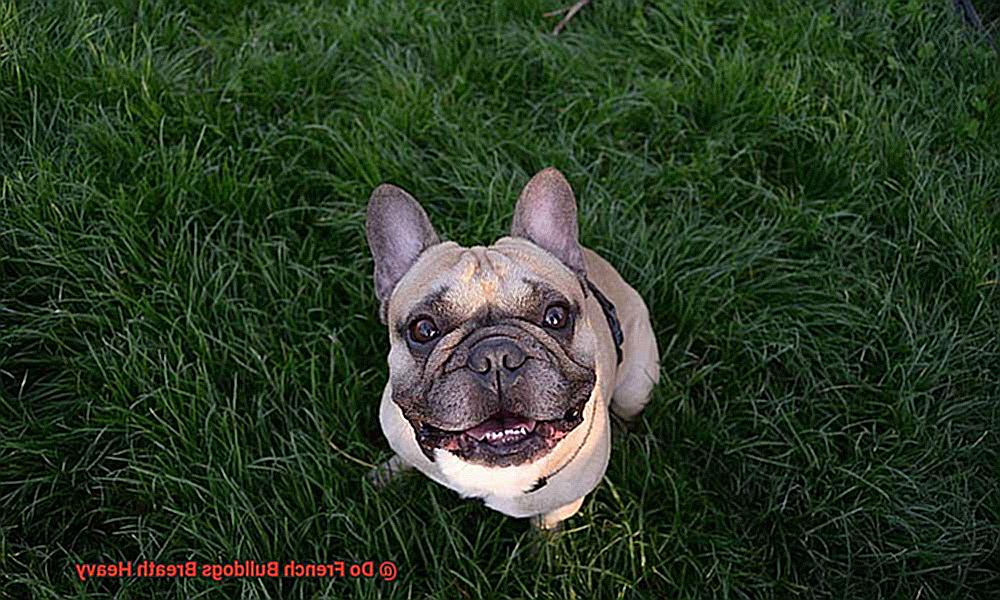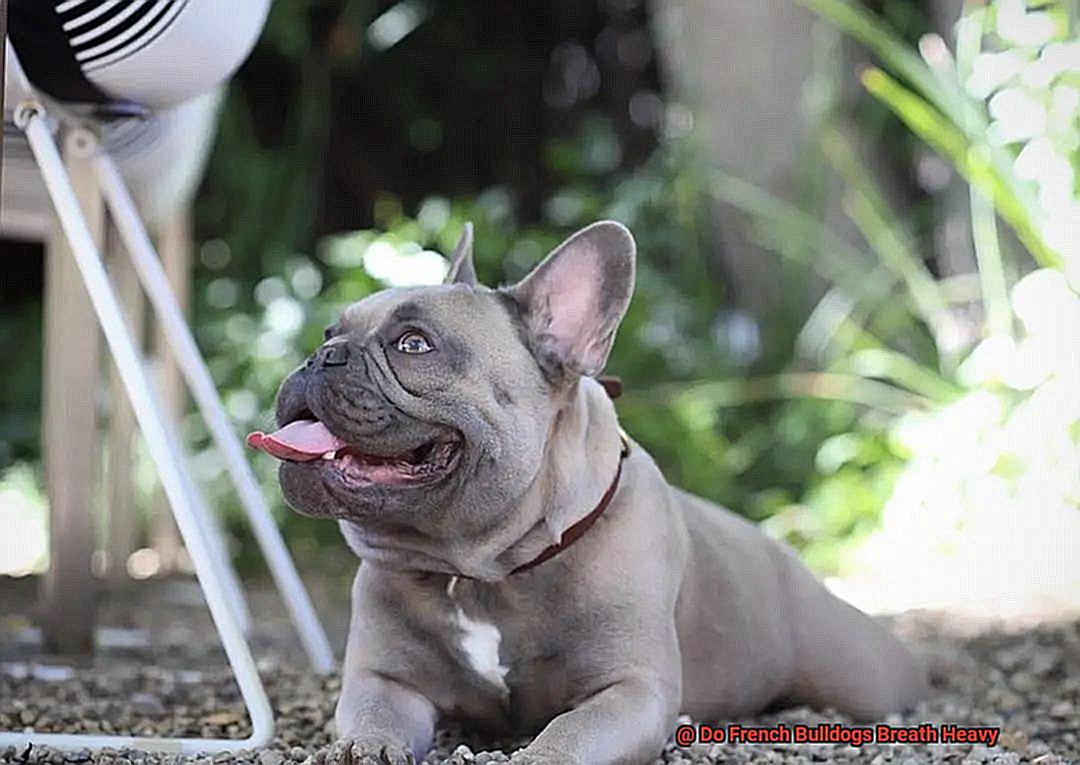Do French Bulldogs Breath Heavy?
If you’re a proud Frenchie owner or simply captivated by these adorable little bundles of joy, then this blog post is tailor-made for you.
French bulldogs have stolen hearts across the globe with their distinctive looks and lovable personalities. But let’s talk about one thing that sets them apart – their unmistakable breathing style. Do those heavy breaths indicate a problem or are they just part of what makes these pups so uniquely charming? Get ready to dive deep and uncover the truth behind those endearing snorts and snores.
Before we delve into the nitty-gritty of French bulldog respiration, let’s take a moment to appreciate these delightful creatures. Originating from a mix between English bulldogs and local ratters in France, Frenchies have an irresistible charm that’ll make your heart melt. With their adorable bat-like ears, squishy faces, and compact bodies, it’s impossible not to fall head over paws for these furry companions.
Now, let’s address the elephant in the room: French bulldogs are notorious for their audibly heavy breathing. Their unique anatomy – short snouts and flat faces – contributes to what some might perceive as labored breaths. While these features add to the Frenchie’s cuteness factor, it’s crucial to understand how they can impact their respiratory system.
Get ready as we unravel the mysteries behind this captivating phenomenon. Join us on this journey as we explore what causes those adorable huffs and puffs, potential concerns you should be aware of, and how you can ensure your beloved Frenchie stays happy and healthy. Whether you’re already an owner or dream of having a Frenchie someday, this blog post is your ultimate guide to understanding their breathing patterns.

Hold on tight, fellow dog enthusiasts, because this blog post will reveal extraordinary facts about French bulldogs and their charmingly heavy breaths.
Together, we’ll uncover the secrets of Frenchie respiration, bust common myths, and deepen our admiration for these unique canine companions.
Join us as we embark on this enlightening adventure.
Exploring the Brachycephalic Airway Syndrome in French Bulldogs
Contents
- 1 Exploring the Brachycephalic Airway Syndrome in French Bulldogs
- 2 Causes of Heavy Breathing in French Bulldogs
- 2.1 Brachycephalic Syndrome: The Trouble with Short Snouts
- 2.2 Obstructed Airway: The Culprits of Restricted Breathing
- 2.3 Heat and Exercise: When Frenchies Get Hot and Heavy…Breathing
- 2.4 Obesity: When Extra Weight Takes a Toll on Breathing
- 2.5 Heart Problems: When Heavy Breathing Signals a Broken Heart
- 2.6 Stress and Anxiety: Taking a Deep Breath…or Not
- 3 Tips for Minimizing Heavy Breathing in French Bulldogs
- 4 Maintaining a Healthy Weight for French Bulldogs
- 5 The Importance of Providing a Cool Environment for French Bulldogs
- 6 Limiting Strenuous Exercise for French Bulldog Owners
- 7 Monitoring Your Dog’s Breathing Patterns
- 8 Seeking Veterinary Assistance if Necessary
- 9 Conclusion
These adorable little companions have stolen the hearts of many with their unique appearance and lovable personalities. However, one common concern among French Bulldog owners is their breathing patterns. In this blog post, we will explore the Brachycephalic Airway Syndrome (BAS) in French Bulldogs – what it is, what causes it, and how it can be treated. So, let’s dive in and learn more about this condition to ensure the well-being of our furry friends.
What is Brachycephalic Airway Syndrome (BAS)?
Brachycephalic Airway Syndrome is a condition commonly found in brachycephalic dog breeds like French Bulldogs. It refers to a combination of anatomical abnormalities that affect their ability to breathe efficiently. The unique head shape and shortened muzzle of French Bulldogs make them particularly prone to this syndrome.
Causes of BAS in French Bulldogs:
The primary factors contributing to BAS in French Bulldogs are their brachycephalic skull structure and anatomical abnormalities. Their short and wide skull, compressed upper jaw, and narrowed nostrils restrict the airflow through their nasal passages, leading to heavy and labored breathing. Additionally, an elongated soft palate, narrowed trachea, everted laryngeal saccules, and hypoplastic trachea can further exacerbate breathing difficulties.

Diagnosing BAS in French Bulldogs:
To diagnose BAS in French Bulldogs, a thorough clinical examination by a veterinarian is essential. The examination may involve assessing the dog’s respiratory sounds, evaluating their breathing patterns, and conducting diagnostic tests such as radiographs or endoscopy to visualize the airways. Early detection and diagnosis are crucial in managing the condition effectively.
Treatment options for BAS in French Bulldogs:
The treatment of BAS can range from conservative management to surgical intervention, depending on the severity of the condition. Conservative management includes lifestyle modifications such as weight management, avoiding environmental triggers, and using harnesses instead of collars. Surgical interventions, like nares resection, soft palate resection, and laryngeal saccule removal, aim to address the anatomical abnormalities and improve airflow.
Conclusion:
While French Bulldogs may be prone to Brachycephalic Airway Syndrome, there are ways to manage and alleviate their breathing difficulties. As responsible owners, it is important to be aware of the signs and symptoms of BAS and seek veterinary assistance when needed. With proper care and treatment, we can ensure that our French Bulldogs breathe easy and live a happy and healthy life.
Remember, if you have any concerns or questions about your French Bulldog’s breathing patterns, always consult with a qualified veterinarian for personalized advice and guidance.
Causes of Heavy Breathing in French Bulldogs
In this blog post, we’ll explore the potential causes of heavy breathing in French Bulldogs, shedding light on the challenges these brachycephalic darlings face. So, grab a cup of coffee and let’s dive into the world of French Bulldog respiration.
Brachycephalic Syndrome: The Trouble with Short Snouts
French Bulldogs are characterized by their flat faces and short snouts, which make them prone to a condition known as Brachycephalic Syndrome. This syndrome occurs due to narrowed airways, making it difficult for our furry friends to breathe properly. As a result, heavy breathing becomes a common occurrence.
Obstructed Airway: The Culprits of Restricted Breathing
Elongated soft palates, stenotic nares (narrow nostrils), or an overly long and thickened tongue can obstruct the airway in French Bulldogs. These obstructions restrict the airflow, leading to heavy breathing as our little pals struggle to take in enough oxygen.
Heat and Exercise: When Frenchies Get Hot and Heavy…Breathing
With their brachycephalic features and difficulty regulating body temperature, French Bulldogs are particularly susceptible to overheating. When exposed to high temperatures or engaged in excessive physical activity, they may resort to heavy breathing as a means of cooling down their bodies.
Obesity: When Extra Weight Takes a Toll on Breathing
Just like humans, French Bulldogs can experience the consequences of carrying excess weight. Obesity puts additional strain on their respiratory system, making it harder for them to breathe freely. The extra fat around their chest and neck area compresses the airways, resulting in heavy breathing.
Allergies and Respiratory Infections: A Breath of Fresh Air, Please.
French Bulldogs are not immune to allergies or respiratory infections. These conditions can cause inflammation in their airways, narrowing the passage for air and leading to heavy breathing as our furry friends compensate for the restricted airflow.
Heart Problems: When Heavy Breathing Signals a Broken Heart
Certain heart conditions, such as congestive heart failure or pulmonary hypertension, can cause fluid accumulation in a French Bulldog’s lungs. This fluid buildup makes it challenging for them to breathe normally, resulting in heavy breathing.
Stress and Anxiety: Taking a Deep Breath…or Not
Even our beloved French Bulldogs can experience stress and anxiety. When they feel anxious or scared, their breathing rate increases, leading to heavy and rapid breaths.

Tips for Minimizing Heavy Breathing in French Bulldogs
French Bulldogs are adorable and beloved pets known for their unique appearance and friendly personalities. However, their brachycephalic (short-faced) anatomy can lead to heavy breathing and respiratory issues. In this article, we will share some helpful tips to minimize heavy breathing in French Bulldogs, ensuring their comfort and well-being.
Keep them in a cool and well-ventilated environment:
French Bulldogs are sensitive to temperature extremes, so it’s important to provide them with a comfortable living space. Avoid exposing them to hot weather and ensure they have access to shade and fresh water at all times. Additionally, keep the indoor environment well-ventilated to improve air circulation.
Monitor their physical activities:
While regular exercise is important for French Bulldogs, it’s crucial to monitor their breathing during physical activities. Avoid intense exercises or long walks, especially in hot weather, as it can strain their respiratory system. Opt for shorter and less strenuous activities that won’t put excessive pressure on their breathing.
Maintain a healthy weight:
Excess weight can further restrict the airways of French Bulldogs, making it harder for them to breathe. Consult with a veterinarian to determine the ideal weight for your dog and follow a balanced diet accordingly. Regular exercise can also help in maintaining a healthy weight.
Pay attention to air quality:
The quality of air your French Bulldog breathes can affect their breathing patterns. Avoid exposing them to smoke, strong chemical odors, or other respiratory irritants. Keep their living space clean to reduce dust and allergens that could trigger breathing difficulties.
Consider using a harness instead of a collar:
Some French Bulldogs may benefit from wearing a harness instead of a collar when going for walks. Collars can put pressure on their necks and potentially restrict their airways, while harnesses distribute pressure more evenly across their chest.
Regular veterinary check-ups:
Regular visits to the veterinarian are essential for monitoring your French Bulldog’s respiratory health. The vet can assess their breathing, check for any underlying conditions, and provide appropriate treatment if necessary. They can also offer specific advice tailored to your dog’s needs.
Maintaining a Healthy Weight for French Bulldogs
French Bulldogs are adorable pets known for their unique appearance and friendly personalities. However, their low exercise needs and love for food make them prone to obesity. Maintaining a healthy weight is crucial for their overall well-being and respiratory health. In this article, we will provide expert tips and tricks on how to keep your French Bulldog at a healthy weight.
Balanced Diet:
- Consult with your veterinarian to determine the appropriate amount of food for your Frenchie based on age, size, and activity level.
- Avoid overfeeding or free-feeding. Establish a feeding schedule and measure out portion sizes for each meal.
- Choose high-quality dog food with lean protein sources, whole grains, and limited fillers or additives.
- Incorporate fresh fruits and vegetables as healthy treats or additions to their meals.
Regular Exercise:
- Though not highly active dogs, French Bulldogs still need daily exercise to burn calories and maintain muscle tone.
- Take them on short walks multiple times a day.
- Engage them in interactive play sessions.
- Provide them with puzzle toys that encourage physical activity.
Weight Monitoring:
- Regularly weigh your Frenchie using a pet scale or consult with your veterinarian for body condition scoring.
- Track any fluctuations in weight to make necessary adjustments to their diet and exercise routine.
Veterinary Guidance:
- If your Frenchie is gaining weight despite your efforts, consult with your veterinarian for guidance.
- They may recommend a weight management plan tailored to your Frenchie’s specific needs.
- They can also rule out any underlying health issues contributing to the weight gain.
The Importance of Providing a Cool Environment for French Bulldogs
As a proud owner of a French Bulldog, you know just how special and unique these little furry companions are. With their adorable flat faces and lovable personalities, French Bulldogs steal the hearts of everyone they meet. However, it’s essential to understand that their distinctive anatomy requires some extra care, especially when it comes to temperature regulation.
French Bulldogs are brachycephalic breeds, which means they have a short snout and flat face. While these features contribute to their irresistible cuteness, they can also cause breathing difficulties, particularly in hot and humid environments. Their narrow nasal passages and elongated soft palate make it harder for them to breathe efficiently, leading to heavy breathing and panting.
Heat can exacerbate the breathing problems in French Bulldogs. They are highly susceptible to heatstroke and heat exhaustion, as they struggle to regulate their body temperature effectively. It is crucial to provide a cool environment for them to prevent overheating and ensure their well-being.

So how can you create a cool environment for your French Bulldog? Here are some expert tips:
- Keep them indoors or in well-ventilated areas: During hot weather, it’s best to keep your French Bulldog indoors or in spaces with proper ventilation. Avoid leaving them in confined spaces without adequate airflow.
- Use air conditioning or fans: To maintain a cool and comfortable environment, consider using air conditioning or fans in your home. These cooling methods can help regulate the temperature and keep your French Bulldog at ease.
- Provide access to fresh water: Hydration is crucial for French Bulldogs, especially in hot weather. Make sure they have access to fresh water at all times. Keeping them hydrated aids in regulating their body temperature and prevents overheating.
- Avoid extreme temperatures: French Bulldogs are sensitive to both extreme heat and cold. Avoid exposing them to temperatures that are too hot or too cold. They can suffer from heatstroke or hypothermia, which can be life-threatening.
Limit strenuous activities during the hottest parts of the day: Exercise is vital for French Bulldogs, but it’s essential to be mindful of the temperature. Avoid taking them for walks or engaging in strenuous activities during the hottest parts of the day. Instead, opt for cooler times, such as early morning or late evening.
- Ensure proper ventilation when traveling: If you’re traveling with your French Bulldog, make sure the vehicle has proper ventilation. Never leave them alone in a parked car, as temperatures can rise rapidly and lead to life-threatening conditions.
- Grooming and maintenance: Regular grooming plays a significant role in keeping your French Bulldog cool. Brushing their coat helps remove excess hair and prevents matting, which can contribute to overheating. Additionally, trimming their nails and keeping their paw pads clean aids in heat dissipation.
Limiting Strenuous Exercise for French Bulldog Owners
As a French Bulldog owner, it is crucial to be mindful of your furry friend’s unique anatomy and limitations when it comes to exercise. These adorable flat-faced pups, known as brachycephalic breeds, have narrower airways and smaller nostrils compared to other dog breeds.
This can result in breathing difficulties and heavy panting, especially during physical activity or in hot weather.
To ensure the well-being of your French Bulldog, it is important to limit strenuous exercise and make appropriate adjustments to their exercise routine.

Control Duration and Intensity
One way to limit strenuous exercise is by controlling the duration and intensity of physical activity. While other dog breeds may thrive on long hikes or intense agility training, French Bulldogs may not be able to handle such strenuous activities.
Instead, opt for shorter walks or play sessions that still provide mental and physical stimulation without putting excessive strain on their respiratory system.
Be Mindful of Temperature and Humidity
French Bulldogs are more prone to heat exhaustion and heatstroke due to their compromised respiratory system. As a responsible owner, it is crucial to be mindful of the temperature and humidity levels when exercising your furry friend.
Avoid exercising them during the hottest parts of the day, provide ample shade, and always carry water to keep them hydrated. If the weather is excessively hot or humid, it may be best to skip exercise altogether and engage in indoor activities instead.
Regular Breaks and Access to Water
During exercise, French Bulldogs should be given regular breaks to catch their breath and cool down. Provide access to fresh water at all times so they can drink whenever needed. This will help prevent overheating and allow them to recover before continuing with their physical activity.
Consult with a Veterinarian
Every French Bulldog is unique, with their own individual limitations and potential health conditions. It is highly recommended to consult with a veterinarian for guidance on appropriate exercise routines. They will be able to advise you on the best exercises for your French Bulldog, taking into consideration their specific needs and any underlying health conditions.
Low-Impact Exercises
While limiting strenuous exercise is necessary for the well-being of French Bulldogs, they still require regular physical activity to maintain a healthy weight and overall fitness level. Low-impact exercises such as swimming or gentle walks can be beneficial alternatives. These activities provide a great source of exercise while minimizing strain on their respiratory system.
Monitoring Your Dog’s Breathing Patterns
In this expert-level guide, we will explore the ins and outs of monitoring your French Bulldog’s breathing patterns. So grab a cup of coffee, get comfy, and let’s dive right in.
Observing Breathing at Rest:
First things first, take a moment to observe your Frenchie’s breathing when they’re just chillin’ and relaxing. Normal breathing should be calm, steady, and as quiet as a cat sneaking up on a mouse. Keep an ear out for any unusual sounds like wheezing, snorting, or gasping – these could be signs of a respiratory issue that needs attention.
Rate of Breathing:
Now, let’s talk about the rate of your Frenchie’s breaths per minute. A healthy French Bulldog usually takes around 20-30 breaths while resting. If you notice a significantly higher respiratory rate, it might be time to pay attention. Your furry friend could be experiencing distress or discomfort.
Body Language While Breathing:
Watch out for those telltale signs of difficulty breathing – extended neck and head positioning, flared nostrils, and exaggerated chest movements. These signs are like red flags waving in the wind, signaling that your Frenchie might be struggling to get enough air into their adorable little lungs.
Breathing During Physical Activity:
French Bulldogs love to play and have fun, but their unique respiratory system can sometimes put them at risk. Keep an eye out for excessive panting, labored breathing, or difficulties catching their breath after exercise. If you spot any of these signs, it’s time to take action and provide some much-needed rest and cooling down for your furry pal.
Checking for Cyanosis:
No, we’re not talking about some fancy color you’d find in an art gallery. Cyanosis is the bluish discoloration of mucous membranes due to a lack of oxygen. So, check your Frenchie’s gums and tongue regularly for any signs of this bluish tint. If you spot it or notice any other concerning symptoms, don’t wait around – head straight to the vet.
Respiratory Monitors and Wearable Devices:
In this age of technology, we’ve got some cool gadgets that can help us keep an eye on our Frenchie’s breathing patterns over time. Consider investing in a respiratory monitor or a wearable device specifically designed for dogs. These nifty gadgets give you valuable insights into your pup’s respiratory health and can detect any abnormalities early on.
Seeking Veterinary Assistance if Necessary
We all know how adorable and unique these little pups are with their smushed faces and playful personalities. But did you know that their cute features can sometimes lead to breathing difficulties? It’s true. French Bulldogs are prone to a condition called Brachycephalic Airway Syndrome (BAS), which can cause heavy breathing and other respiratory issues.
Why is Heavy Breathing a Concern?
Now, you might be thinking, “Well, my Frenchie always breathes a little heavier than other dogs. Is that something to worry about?” And the answer is…maybe. While it’s true that French Bulldogs tend to have a bit of a snort or a snore, excessive heavy breathing can be a sign of an underlying problem.
Heavy breathing in French Bulldogs can indicate that their brachycephalic anatomy is causing restricted airflow. This can lead to discomfort, reduced exercise tolerance, and even serious health issues if left untreated.
So it’s important to keep an eye on your furry friend’s breathing patterns and seek veterinary assistance if you notice any concerning signs.
When Should I Seek Veterinary Assistance?
If your French Bulldog is experiencing heavy breathing that seems more severe than usual, it’s time to schedule a visit to the vet. Here are some red flags to watch out for:
- Labored Breathing: If your Frenchie seems to be working extra hard to breathe, with visible effort and increased respiratory rate, it’s definitely cause for concern.
- Noisy Breathing: Does your dog sound like they’re snorting, wheezing, or snoring louder than usual? These could be signs that their airways are being obstructed.
- Exercise Intolerance: Does your pup get tired more quickly than before? Do they seem to struggle with physical activity? Difficulty breathing during exercise can be a clear indication that something’s not right.
- Cyanosis: This is a fancy term for when your Frenchie’s gums, tongue, or lips turn blue or gray. It’s a serious sign of oxygen deprivation and requires immediate veterinary attention.
What to Expect at the Vet
When you take your French Bulldog to the vet for heavy breathing, they’ll perform a thorough examination of their respiratory system. This may include listening to their lungs, checking their heart rate, and assessing their overall health. In some cases, diagnostic tests like X-rays or airway endoscopy may be necessary to get a closer look at any anatomical abnormalities.
Conclusion
French bulldogs are known for their distinctive appearance and charming personalities.
However, one common concern among potential owners is whether these adorable pups breathe heavily. The answer is yes, French bulldogs do tend to have heavy breathing compared to other dog breeds.
This is due to their unique facial structure, which includes a short snout and narrow nostrils. These characteristics can cause respiratory issues and make it more difficult for them to breathe efficiently.
As a result, French bulldogs may exhibit heavy panting, snoring, and wheezing. It’s important for owners to be aware of this trait and take appropriate measures to ensure their furry friends are comfortable and safe.
Regular exercise, maintaining a healthy weight, avoiding extreme temperatures, and providing proper ventilation are all essential in managing their breathing difficulties.




